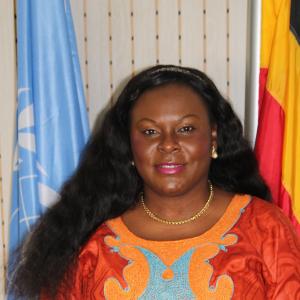Remarks at the Launch of the project “Bolstering Ethical Recruitment Policies and Practices in Migration Pathways from Uganda
The projects aims to prevent exploitation and better protect migrant workers from Uganda
Honourable Frank Tumwebaze, Minister of Gender, Labour and Social Development,
Her Excellency Natalie E. Brown, Ambassador of the United States of America to Uganda,
His Excellency Mr. Jamal M. Al Madani, Ambassador of the Kingdom of Saudi Arabia to Uganda,
His Excellency Abdallah Mohammed Abdallah Al – Takawi, Ambassador of the United Arab Emirates to Uganda,
Colleagues from the United Nations System in Uganda,
Distinguished Guests, Ladies and Gentlemen.
More than three years ago, IOM, the United Nations Migration Agency, shocked the world with vivid reports of ancient-style slavery in modern-day Libya. Human beings being bought, sold, beaten, even murdered by other human beings with one thing in mind: money and profit. It seemed unreal and yet it wasn't.
Contemporary slavery, modern slavery or neo-slavery is estimated by the International Labour Organization (ILO), to include at least 40 million people worldwide. These include people affected by forced labor, those exploited as domestic workers-in construction-in agriculture. It also includes victims of human trafficking, millions sexually exploited as well as women and girls forced into alleged marriages. Many Ugandan migrant workers who have returned from work stints abroad tell tales of being treated as if they are not human beings.
This is an abomination, a tragedy for which we have a collective responsibility to eliminate and eradicate. The UN Charter Preamble begins with We the people- an inclusive definition of the human race and the right to peace and a dignified life for all. The African philosophy of Ubuntu places emphasis on 'being self through others'. It is a form of humanism which can be expressed in the phrases 'I am because of who we all are'. In Uganda, we refer to the Ubuntubulamu philosophy which informs the implementation of the 2030 Agenda for Sustainable Development which is a global compact that aims to promote people centered partnerships to achieve prosperity and peace while protecting the planet we call home. Implementing the SDGs is a clarion call to eradicate slavery in all its forms. On behalf of the UN, I reiterate our commitment to tackle human trafficking, modern slavery and forced labour as outlined in targets under SDG 5 Gender Equality and SDG 8 Decent Work and Economic Growth. We will also leverage the UN’s Global Compact on Migration, Objectives 6 and 10 to inform our contribution to this fight.
Ladies and Gentlemen, in July this year, the UN Deputy Secretary-General Amina Mohammed said “Modern slavery is a matter of human rights and dignity. But it is also tragically linked to sustainable development, or the lack thereof. Many have fallen into this oppressive trap trying to escape poverty — or in search of an opportunity to improve their lives and support their families.” In this context, I commend IOM Uganda for developing this initiative to prevent exploitation or enslaving of Ugandan migrant workers abroad. I would also like to convey my deep appreciation to the Government of the United States of America and the Global Fund To End Modern Slavery for financing and co-creating this initiative with us. I would like to recognize the role of the Uganda Association of External Recruitment Agencies (UAERA) in the implementation of this project. My questions to you are: How are you going to make sure that you make profits without contributing to slavery? Which measures will you use to ensure ethical recruitment? How will you ensure that the African and global values around our shared humanity translate into your business model?
Ladies and Gentlemen, confronting the modern slavery cartels have always been a monumental challenge, not least because human trafficking is, tragically, big business. It is important to look at the impact of the pandemic on this phenomenon. According to our Analysis of the Socioeconomic Impact of COVID-19, many Ugandan migrant workers abroad lost jobs; remittances to Uganda are falling, and a rising number of households are slipping into poverty. With this comes a desperate scramble of strong young people for opportunities. It is in these conditions of heightened desperation that traffickers and enslavers thrive. Therefore, the project we are launching today is timely. Informed by the UN Sustainable Development Cooperation Framework 2021- 2025, recently launched by His Excellency the President, I reiterate our commitment to expand the impact of this initiative through our work in critical social protection, the rule of law, justice and governance among others.
Before I conclude, I would like to convey our deep appreciation to the government and people of Uganda for our long-standing partnership to address existing and emerging challenges. A particular vote of thanks on this occasion goes to the Ministry of Gender, Labour and Social Development, the Ministry of Interior and the Ministry of Foreign Affairs as well as to all the civil society and grassroots partners and to all the youth in this country for your contributions which helped to inform this initiative.
I would like to conclude with a quote from Nelson Mandela, “For to be free is not merely to cast off one’s chains, but to live in a way that respects and enhances the freedom of others.” Thank you for your attention.
Speech by






